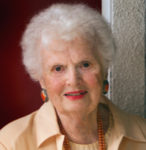By Natasha Josefowitz, ACSW, Ph.D.

LA JOLLA, California — My last column about my life story was published a couple of years ago. I had graduated from Columbia University at age 38, the oldest member of my class, with a master’s in Clinical Social Work. Two weeks later was my son Paul’s Bar Mitzvah.
My husband’s business was taking him more often to Europe and Asia, and it made no sense for us to stay in America. Our family would be able to spend more time together if we lived in Europe. Switzerland seemed to be the most central, and it was the country Sam felt most at home in because he had gone to school there. He wanted his children to have the same education he had.
The apartment had been sold and the furniture shipped overseas. The day after the Bar Mitzvah, our entire family was on a ship sailing to Europe. Thirty of our friends were at the dock sending us off; everyone was crying, including all of us. The trip was uneventful; we were both sad to leave and anxious about our upcoming adventure. The ship docked at Le Havre. We drove to Paris and took a plane to Lausanne. Lausanne is a lovely city on Lake Geneva. We were able to sublet the apartment of a friend.
My first encounter with the Swiss culture was when I went to the school to register my children. Swiss schools offered two options: a humanities or a science track—both leading to college. Nina opted for the science track; she was the only girl in that section for the entire four-year program. Paul, on the other hand, elected the humanities track . When I asked about lunches at the school, the school director looked at me horrified and said, “What madame, you don’t want your children to come home to eat lunch?” Oops, I did not know that all children went home for lunch and then returned to school. Not only were students sent home for lunch, but husbands would leave their work and come home for the main meal of the day. (I remember my father also coming home for lunch in Paris in the 1920s.)
Lunch was called “dinner” and dinner was called “souper” (which de facto meant soup with some bread and cheese or cold cuts with a salad and fruit). In the 1960s most women in Switzerland would market every day to be sure that the baguettes were fresh. Our family’s favorite dish turned out to be fondue, dipping pieces of bread into warm, melted cheese.
I wanted to use my newly minted social work skills and found a job teaching the principles of case work, which had never been taught in the local school of social work. It was a professional school not affiliated with the university. Students stood up whenever I entered the classroom, and they were to be called by their last names preceded by mademoiselle or monsieur. I translated all my class notes from Columbia into French. Case work is the presentation of a problem which students need to find the best way to help the client to resolve. It was challenging to teach this method, which included starting where the client is and including him or her in finding a solution. Swiss students were raised in a more authoritarian culture. Traditionally, the social worker was the authority; he or she knew best and told the client what to do and how to do it. The students had difficulty participating because they were accustomed to just being lectured to. When I presented a case, they wanted to know what I thought about it. The hesitancy was due to the fear that they might answer wrong. I reassured them that wrong answers are good because that is how we learn, but I was not really believed. It took a semester to overcome their reluctance to participate. It soon became known that I had a strange way of teaching and other teachers would come to classes to observe. This same thing happened few years later when I taught at the University of Lausanne
After the students graduated, most of them had jobs. I supervised them on a weekly basis, discussing their caseload. With time, these students would become supervisors themselves. I organized a graduate class for supervisory training. I particularly enjoyed the personal coaching aspect of this curriculum. What an incredible opportunity and challenge to be able to offer new classes to my Swiss students.
Moreover, I wanted to become a member of the Academy of Certified Social Workers (ACSW) I found an American woman living in Geneva who was an academy member and was willing to supervise me. The process took many months of driving to Geneva every week. This is how I can put “ACSW” after my name.
© Natasha Josefowitz. This article appeared initially in the La Jolla Village News. You may comment to natasha.josefowitz@sdjewishworld.com